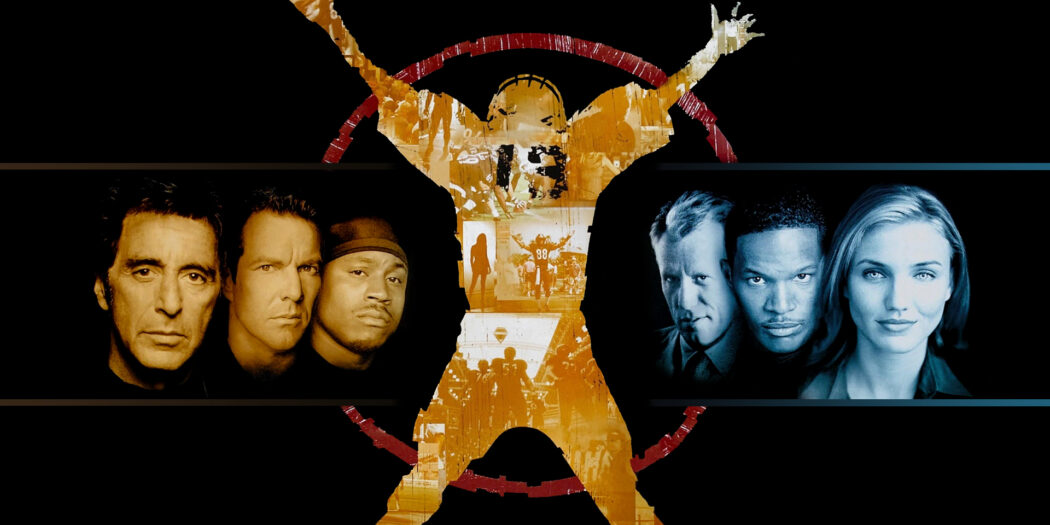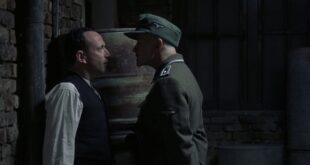I firmly believe that any man’s finest hour, the greatest fulfillment of all that he holds dear, is that moment when he has worked his heart out in a good cause and lies exhausted on the field of battle – victorious. – Vince Lombardi
Oliver Stone invokes various opinions from people, both as a filmmaker and a person. He has never been one to avoid controversy, and his films are often accused of muckraking and grandstanding. Any Given Sunday represents an end to his finest run as a filmmaker from 1986-1999. Salvador, Platoon, Wall Street, Talk Radio, Born on the Fourth of July, The Doors, JFK, Heaven & Earth, Natural Born Killers, Nixon, U-Turn, and Any Given Sunday. A remarkable run. He won the Oscar for Best Director twice (Platoon, Born on the Fourth of July). Platoon won Best Picture. JFK was nominated for 8 Oscars, including Best Director.
His filmmaking technique grew over the years, beginning with Born on the Fourth of July, in which Stone started experimenting with different camera formats and editing techniques. Operating like a jazz musician, Stone uses varied film stocks, contradictory cutaways, and more to make his films a unique experience. This is something by the time JFK and Natural Born Killers Stone had fully begun to master. Many critics will compare this technique to MTV techniques of the time. I don’t quite agree with that. While they share some similarities, I think Stone developed his technique because he trusted audiences could handle a lot of information and images simultaneously. This allows him greater flexibility as a filmmaker to make his projects more ambitious.
Any Given Sunday began to see critical acclaim for Stone starting to wane. After Nixon (1995), the critical backlash against him from films like JFK, Natural Born Killers, and The Doors began to rear its ugly head. U-Turn, a small neo-noir released in 1997, did not receive positive critical reception. Even Siskel & Ebert, longtime Oliver Stone defenders, both ransacked U-Turn. There’s a sense that they were ready for him after ten years of unparalleled success from 1986-1996. Nixon was a box office bomb, and U-Turn was a critical and commercial failure. Stone was looking to broaden his appeal with Any Given Sunday, which was a substantial attempt by him to fashion an epic hit that would attract audiences.
Any Given Sunday was released on Christmas Day 1999, which suggests a big-time Oscar release, to mixed reviews from critics. It earned 52% on Rotten Tomatoes, with the consensus being: “Sometimes entertaining, but overall Any Given Sunday is a disappointment coming from Oliver Stone.” That’s one of the weakest Rotten Tomatoes consensuses I’ve ever seen. Any Given Sunday is monumental entertainment from start to finish. It’s overblown, exhausting, tiring, bloated, and thrilling. Very rarely have I seen a film built for mass audiences that crams so much into one exhausting film. Then again, watch an NFL football game.
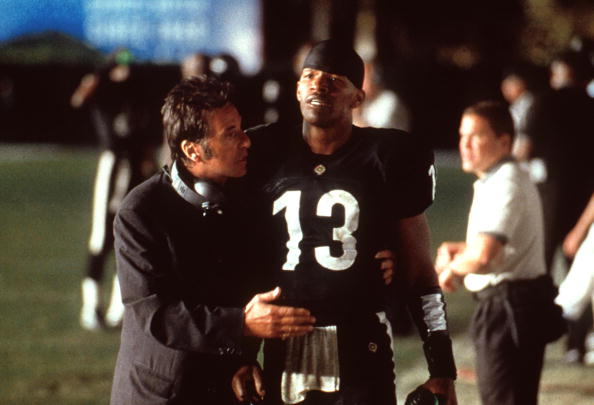
The film tells the story of the Miami Sharks, and the action begins in the middle of the 2001 season (Stone set it two years in the future because he wanted the film to represent a kind of rebirth for the new century) where the Sharks are struggling. Veteran quarterback Cap Rooney (Dennis Quaid) goes down, then so does his backup! That means Coach Tony D’Amato (Al Pacino) is down to his third-string quarterback Willie Beamen (Jamie Foxx) is up, and he is not ready. Beamen struggles at first but eventually gains confidence, and the Sharks start to win some games. The drama occurs around Beamen’s rise, which causes him to become cocky and greedy, falling into all the traps of the capitalist death trap. In a rivetingly acted scene between Foxx and Pacino, Beamen explains how he was screwed over in college because he took a booster and how that dropped him six rounds in the draft. Still, Beamen starts pissing off his teammates because of his cockiness. He starts dissing teammates and coaches openly in public.
That’s the main story in Any Given Sunday, but there’s also a slew of things happening around that. Al Pacino’s D’Amato is aging and perhaps out of touch with the modern game. He is at odds with the ambitious young owner of the team Christina Pagniacci (Cameron Diaz), who is tired of D’Amato’s old ways and wants to be more hands-on. She has already set Tony’s departure in motion by hiring young offensive coordinator Nick Crozier (Aaron Eckhart) as his eventual replacement. Elsewhere Cap Rooney (Dennis Quaid) is the injured veteran quarterback with a long history with D’Amato but is being pushed out by Christina, especially after Beamen starts to play well. Cap is also at odds with a somewhat abusive wife, played excellently by Lauren Holly, who goads him almost without sympathy. There’s LL Cool J’s Julian “J-Man” Washington. He’s resentful of Beamen because he changes the plays, and Beamen’s stardom affects his stats and money.
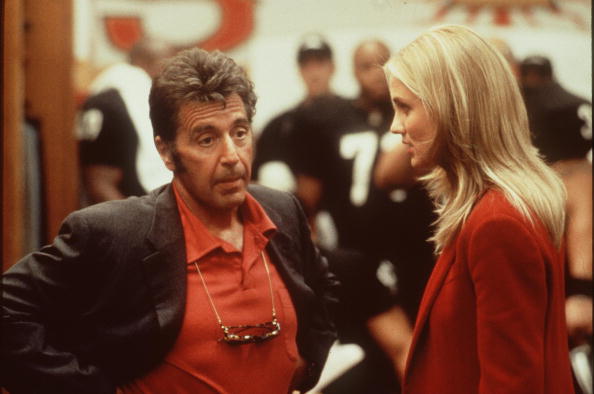
Rounding out the main cast is a delightfully sleazy James Woods (who can play sleazy in his sleep) as the crooked team doctor who often risks the player’s health, so the team has a better shot at winning. This is snuffed out by the team internist Ollie played by Matthew Modine. Jim Brown as the defensive coordinator and longtime confidant of Tony. They both get drunk and lament the direction the game is going in. Lawrence Taylor is fabulous as Luther “Shark” Lavay, an aging linebacker anticipating a bonus but suffers from concussions. There are cameos in the film by ex and then current NFL players. Some of the most memorable are Dick Butkis, Johnny Unitas, and Warren Moon. A host of current NFL players in 1999 made cameos like Emmitt Smith, Ricky Watters, Terrell Owens, and Irving Fryar.
A considerable part of what makes Any Given Sunday such a delight is every single performance from top to bottom is flawless. The two most impressive arguably are Cameron Diaz, who afforded this opportunity to show her dramatic range, and Jamie Foxx, who stuns. It’s easy to see how Foxx became the star he is today. The dramatic scenes sparkle with excellent dialogue and intense acting. John Logan and Oliver Stone wrote the script. Still, Stone alamagated this script from several sources, including On Any Given Sunday by John Logan, Playing Hurt by Daniel Pyne, and the 1994 book You’re Okay, It’s Just a Bruise: A Doctor’s Sideline Secrets by Robert Huizenga.
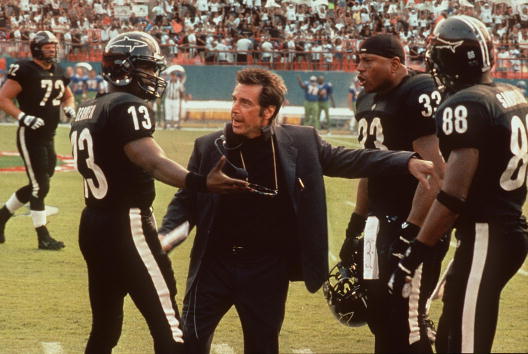
Many themes and issues Any Given Sunday deal with are still relevant in today’s game. Players playing with injuries is a significant theme, and the metaphor of football as war which Stone, a Vietnam veteran, reminds us of throughout. Nobody knew the impact concussions had on players as CTE had not even been discovered yet, but the film takes on the toll the game takes on players’ bodies and playing through pain. That’s what still has admirers coming back over 20 years later to the film, not to mention the bevy of support it has around players because the film is relevant and even more so than when it was released in 1999.
Also, the players misbehave in the film, snorting cocaine, treating women like trash, abusing pain pills, and engaging in reckless behavior. A month before the film’s release in 1999, a story came out about how Rae Carruth of the Carolina Panthers hired a hitman to kill his pregnant wife. Since then, we’ve seen many incidents the film alludes to, like Ray Rice, Greg Hardy, Adrian Peterson, and Aaron Hernandez. Not to mention OJ Simpson 1999 was still very much in the spotlight. However, many NFL players like the film because it accurately depicts their world.
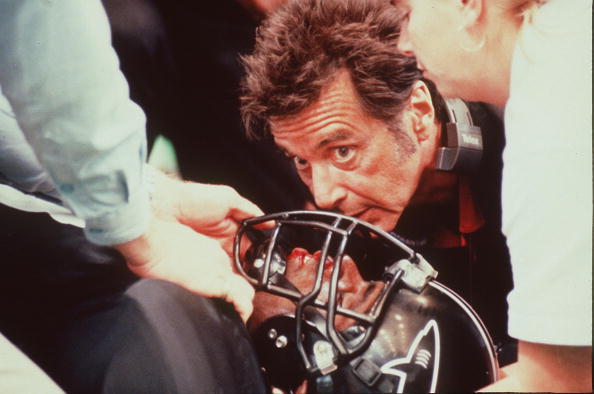
You could argue that the film’s main villain is the culture of money and football. The idea of money being a corrupting influence everywhere. This is represented in the film by Cameron Diaz and James Woods, products of the system. There’s an excellent scene between Diaz and Woods in the movie where Diaz treats longtime Sharks like Shark Lavay and Cap merely as dollar signs. Christina tells Mandrake to fake the results of Lavey’s concussion so he can play in the big game against Dallas. Later regarding Lavay, she says, “No one is going to sign a $2 million concussion case…Cut him, sign him for 30% if we need him.” It’s a pertinent reminder that for many players, the NFL stands for “not for long.”
The film also predicted the rise in passing in the NFL. “People want to see passes, touchdowns, high scores,” Pagniacci says. “That’s the game today.” This is even more true today, with passing having wholly taken over the NFL. There are other themes of past vs. present, old school vs. new school, black vs. white, media vs. coaches, the love of the game vs. the love of money, rock vs. rap, and individual vs. team. Ghosts play a significant part in the film as well—the ghosts of the past. Beamen’s final touchdown at the end against Dallas almost seems like he’s guided spiritually by a younger Tony D’Amato. Native American music also plays a big part in the conjuring up of the past.
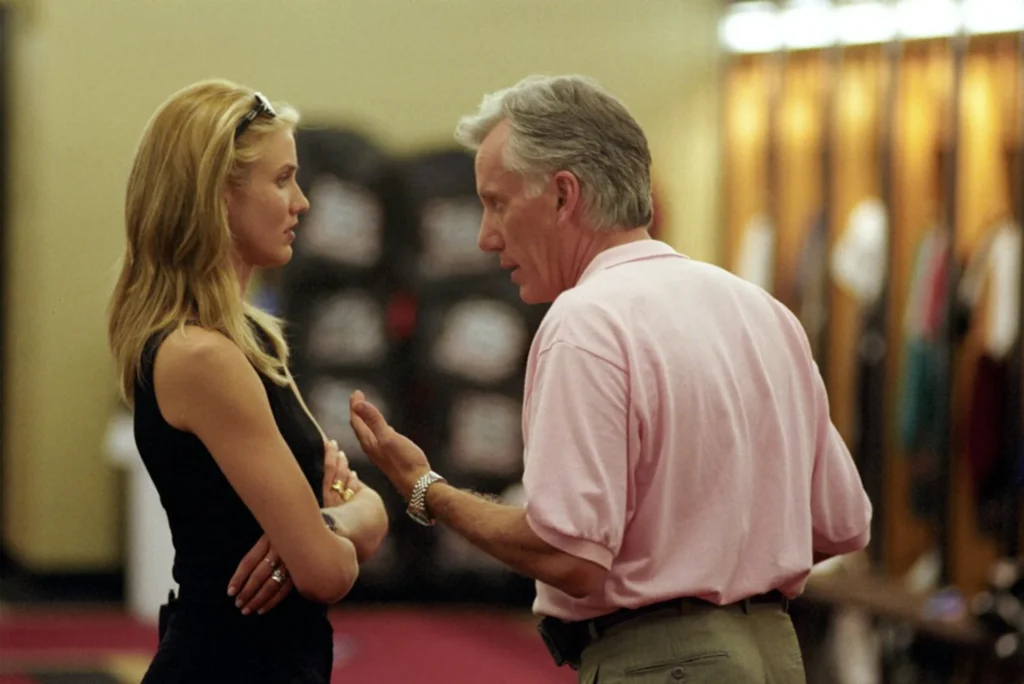
Visually, the film is often talked about, including the in-your-face style of the football scenes. There have never been football scenes like the ones in Any Given Sunday filmed before or after. It’s the opposite of the clean NFL films style shot from the sidelines; Stone puts the camera in Any Given Sunday right in the middle of the action. The result is disorienting and scary. When Beamen first enters the game, we feel anxious and nervous watching him navigate the field with defenders trying to kill him. You can feel the violence of the game right up in your face. Football cannot be faked, and Stone filmed real football games and put the camera right in the middle of the action. Stone showed the crew Saving Private Ryan before the film commenced to capture kind of that chaotic feel to it. Some critics did not appreciate the football scenes, but I think the point is that they’re disorienting. I never had any trouble following the game action in the film and was always aware of the score and who was doing what.
The most famous and heralded scene of the film is Al Pacino’s Game of Inches speech before the final game portrayed in the movie against Dallas. It’s a masterful piece of writing and a speech that often gets played repeatedly through the years. It’s an electric scene that even captivated the real football players in the film. Any Given Sunday is ultimately about change. About how personalities put behind all their garbage and come together as a team to be there for each other. Though the film is ultimately like many other sports movies that way, these moments feel earned in this film, and a significant part of that is the Game of Inches speech Tony gives. It’s Oliver Stone’s most hopeful film, and it was the hope he expressed for the turn of the century. Black quarterbacks are no longer unicorns in the NFL like Beamen. When the film came out, it was Donovan McNabb’s rookie year, Michael Vick was coming on the scene, and now there are many black quarterbacks, including two starting in the Super Bowl this weekend in 2023.
Any Given Sunday is a film I grew up loving. I was always entranced by Stone’s hypnotic style of filmmaking, most on display in films like JFK, Natural Born Killers, and Any Given Sunday. Once he casts you under your spell, it’s best to go with the crazy ride for him. Any Given Sunday takes place in a heightened Oliver Stone reality where football is war, and everything is turned to eleven. Still, almost 25 years later, there’s practically a tameness to Any Given Sunday as the world, and professional sports have become more ridiculous and media-saturated. The invented league in Any Given Sunday, the AFFA (NFL wanted nothing to do with this script), almost seems like what the XFL could have been. It’s a wild mess of a movie, but I love it even more because of it. I love when a director swings for the fences to use a baseball term for a football movie. Even though it embraces sports movie cliches, it feels Oliver Stone uniquely. That’s the difference between this and any other sports movie. A movie that in 1999 might have been seen as ridiculous is now a reality. It’s a riveting film. In short, it’s pure cinematic adrenaline.
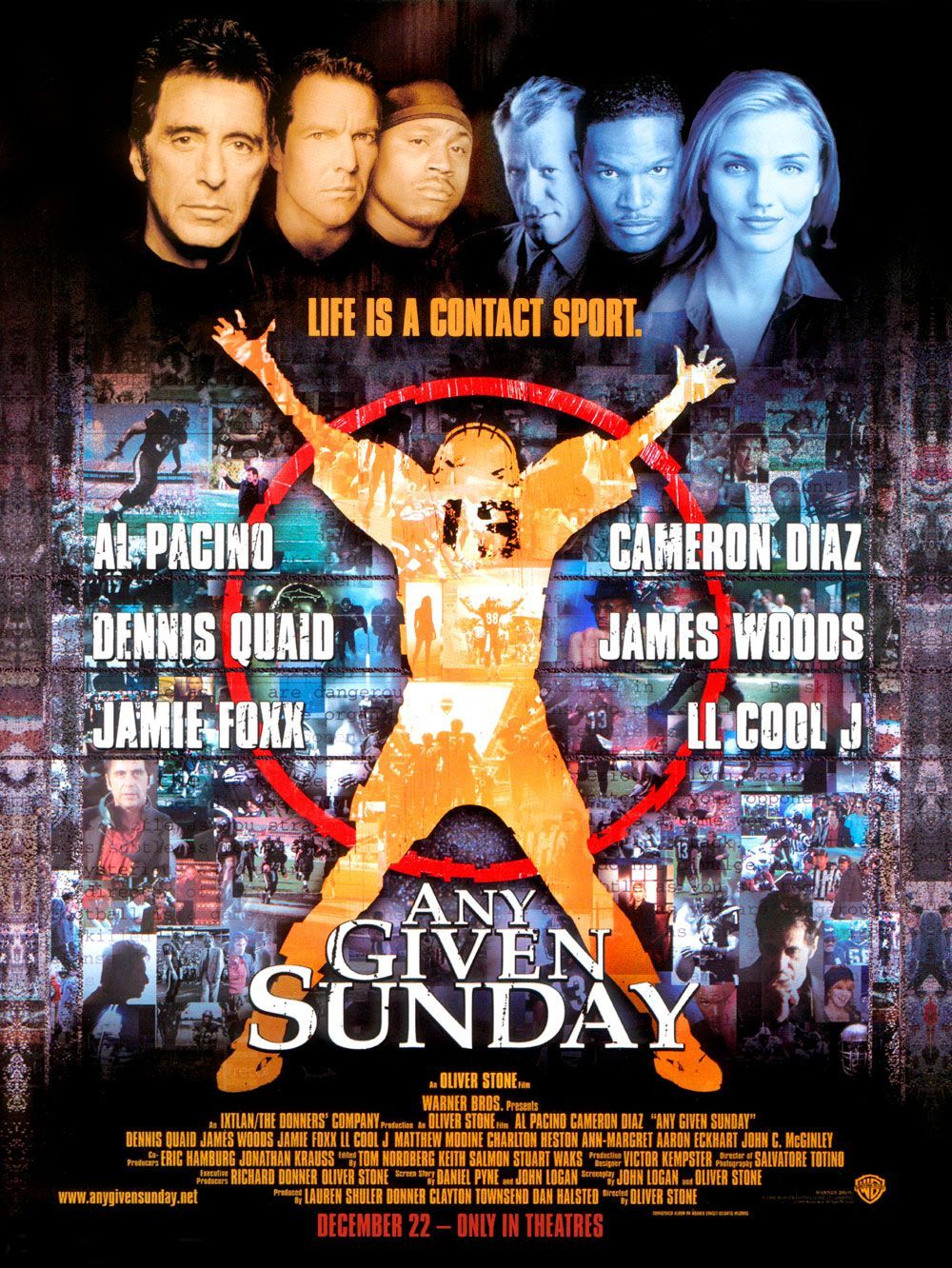
 Movie Finatics The Place for Movie Lovers
Movie Finatics The Place for Movie Lovers
